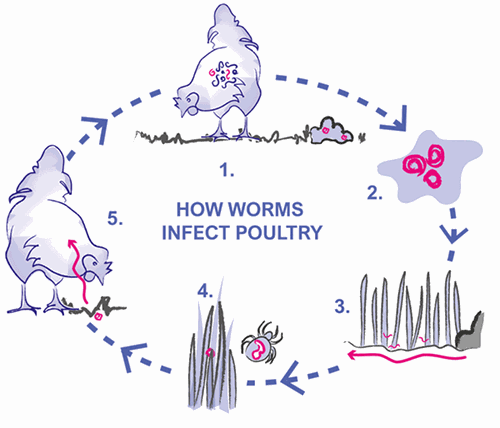The Parasite Lifecycle How worms infect chickens and poultry birds

How do you know if your birds have worms?

It’s impossible to look at a bird and say whether it has intestinal parasites - symptoms are most often generic and could be caused by a range of illnesses and disease. But neither do we want to treat something that may not be present. We wouldn't necessarily see signs of parasite infection in the dung of the bird.
The lifecycle of avian parasites
- Adult worms live in the digestive tract of the birds
- These worms lay thousands of microscopic eggs every day which are passed out in the birds faeces. These eggs are what we are looking for on a worm egg count.
- The eggs can be eaten by a intermediate host (such as a beetle, worm or slug) or begin to hatch into tiny larvae and wriggle away from the dung.
- The larvae or eggs are present in the chickens environment.
- The bird ingests the larvae or infected host as it feeds and the worms go on to continue their lifecycle.

Parasite infect birds either:
- Directly = from the ground/floor
- Indirectly = via an intermediate host such as an earthworm, snail or insect which has eaten the eggs.
Adult female worms lay eggs that are passed in the faeces of their host. In small numbers most can live side by side with their host but larger numbers can cause unthriftiness, disease and death. The way we keep animals also plays into evolution:
- Parasites are most often evolved to infect only one or two animal types
- They are kept in small spaces and graze back over the same area repeatedly
Moving to evidence based control is good practice to monitor and ensure the health of your birds using a faecal worm egg count.